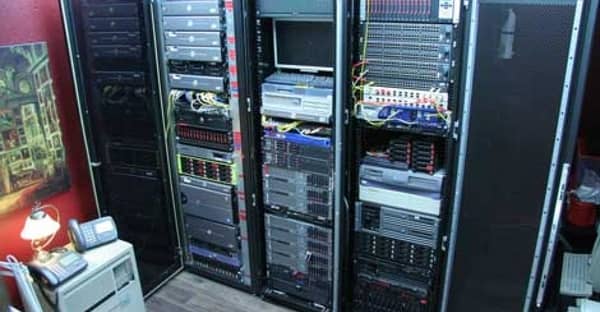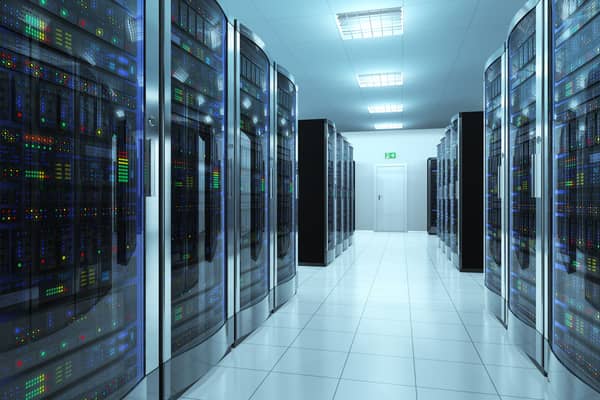
Why Are Fire Suppression Systems Important for Data Centers?
September 2, 2021
Frequently Asked Questions in Technology (Part 5)
September 8, 2021A digital ecosystem is a collection of interconnected information technology resources that work together as a unit. Depending on the particular industry or business, these digital ecosystems could be comprised of various contractors, patrons, applications, third-party service providers, and all relevant technology needed. In recent times, digital ecosystems are becoming more common than self-contained networks. These digital ecosystems are letting companies increase their reach further than their substructure.
A digital ecosystem that reaches further and incorporates various entities can be difficult to set up. Issues arise because many company’s in-house data centers just don’t have the capabilities, and most businesses cannot afford to build a data center that has the power of hyperscale data center needed to thrive in a high-end digital ecosystem. One of the ways to support a successful digital ecosystem is to use a trusted colocation data center, which can provide better scalability and power.

What Are the Various Forms of Digital Ecosystems?
The world is driven by technological advancements, which makes digital ecosystems vital to the growth of many businesses. Three major ecosystems can be beneficial for various companies. These digital ecosystems include the platform ecosystem, collaboration ecosystem, and services ecosystem. Through these ecosystems, businesses can build the digital infrastructure they need to improve their operations.
The first digital ecosystem is the platform ecosystem. This includes all of the basic elements that are used for the digital world including storage, computing, networking, and digital services. Under this umbrella are Infrastructure-as-a-Service and more.
The next digital ecosystem is the collaboration ecosystem. Many companies collaborate with other companies for several different reasons including sharing ideas. This type of ecosystem is important for researchers looking to solve the world’s problems. This could be affiliated Universities or sister companies, but this type of ecosystem is important. It allows multiple companies to share data, communicate quickly and connect more easily.
The last type of digital ecosystem is the services ecosystem. This is where companies create functional services that are made available to other businesses. An example of this could be something like a payment service. This ecosystem helps improve business processes through beneficial functionality.
Because the world is driven by technological advancements, new digital ecosystems will continue to be introduced. This is why businesses need to have the best possible data center infrastructure to keep up with these demands. There are significant differences between an in-house data center and a colocation data center that can greatly affect a company’s digital ecosystem.

The Differences between in-House Data Centers and Colocation
Migrating an in-house data center into a third-party data center using a colocation provider can seem arduous or even counterproductive. A company’s Information Technology team may feel they would be losing some of the control they currently have, but this assumption is wrong on several levels. There are several myths about colocation that we dispel in a recent article. The truth is colocation is affordable and secure. Colocation customers have full control over their infrastructure. Colocation providers have guarantees that help keep businesses available more than a company’s on-premises data center. Colocation data centers also meet strict compliance requirements that could potentially be hard for a small business’ on-premises data center.
It may also be difficult for small businesses’ in-house data centers to operate as efficiently as a trusted colocation data center. This can even turn into higher costs for power and cooling. It can also affect the reliability of the on-premises data center’s connectivity, also known as data center uptime. Moving a company’s data into a data center with a trusted colocation provider can improve all of these different aspects.

How Can Colocation Benefit a Digital Ecosystem?
There are many benefits of a colocation data center. The most obvious of these are from the physical setup of the colocation data center itself, which includes the best power and cooling capabilities. But a colocation data center can also be quite advantageous for what it can offer a company’s digital ecosystem. A colocation data center that is also carrier-neutral allows unparalleled connectivity and flexibility for its customers. Colocation data centers can help businesses connect with additional options that can also be tremendously beneficial.
Colocation data centers have connections. A good colocation provider has access to the best cloud service providers. Colocation providers, with the use of an SDN or a Software Defined Network, can be easily constructed to connect to several cloud applications. Cloud strategies including multi-cloud and hybrid cloud solutions continue to be a good option for many companies. A colocation data center can help with all of these aspects with its various connectivity options.
Another important aspect of managing a data center (which we touched on earlier) is uptime. Any sort of system downtime can be extremely harmful to a business. Downtime can potentially cost some businesses up to $540,000 every single hour. Trusted colocation providers have Service Level Agreements that guarantee the amount of maximum downtime their customers may experience. All data centers that use the Uptime Institute’s Data Center Tier Standard System offer between 99.671% to 99.995% of uptime depending on the tier. The lowest tier, Tier 1 data centers, guarantees their customers less than 30 hours of downtime every year. This is a hard feat to achieve by small in-house data centers. Trusted data centers also have good disaster recovery plans, which also help with uptime.

Conclusion
Digital ecosystems make communication between various contractors, patrons, applications, third-party service providers, and all relevant technology faster and more efficient. These digital ecosystems can benefit from using a trusted colocation provider. By increasing the efficiency of power and cooling, adding connectivity and flexibility increasing the amount of uptime, plus all of the additional built-in benefits that a colocation data center provides will help these digital ecosystems thrive. There are many reasons small to medium-sized businesses should use a trusted colocation provider and improving a company’s digital ecosystem is certainly one of these reasons.
